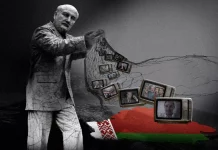By Paul Goble, Window on Eurasia
For six years, Ukrainians have had to fight a war they did not choose but that arose as a result of Russian aggression. Understandably, they are tired of fighting but somehow want to win on the basis of their own actions without having to continue to fight the numerically stronger invader.
That combination of victimhood and a desire for a sense of efficacy explains Vladimir Zelensky’s attraction to many Ukrainians and his victories at the polls, Kseniya Kirillova says. But its internal inconsistencies may very well undermine his standing in a relatively short time and even produce the kind of chaos Moscow will exploit (svoboda.org/a/30072888.html).
“The desire of citizens of Ukraine for peace, on which Russian propaganda loves to play, really exists,” the US-based Russian journalist says; “and it is completely logical because the war was never the choice of the population of this country. Being the victim of aggression, Ukraine has been forced to defend itself.”
Ukrainians have displayed their patriotism and entirely justified anger at what has happened, Kirillova continues; but their country lacks the power “to defeat the army of their opponent which is many times greater than their own unless they are ready to capitulate to the conditions of the aggression.”
That situation, in which they are compelled to fight a war they did not want against an aggressor they cannot by themselves defeat has given rise to entirely unwelcome feelings of powerlessness, feelings that Moscow has tried to exploit and that Ukrainians have sought in various ways to overcome.
“There is a natural temptation to believe that you are capable of influencing the situation, that your fate depends on your own actions. More than that, sometimes it is more comfortable for a victim to believe in his own guilt – and this means in the possibility that one can correct the situation – than it is to admit that you have been forced to suffer for years without guilt.”
Nadezhda Savchenko played on these feelings in 2016 by suggesting that the problem lay less in the Russian invasion as such than in “’the crimes of Poroshenko.’” But “then,” Kirillova continues, “such attitudes were shared only by a minority.” Two years later, however, they “had become extremely popular.”
“The conception of ‘Ukrainian guilt,’” the journalist says, “was formed in two steps.” In the first, the reality of Russian aggression wasn’t denied, but “the illusion was created that ‘the little key’ to the conclusion of the war was to be found in Kyiv,” in its corruption or incompetence, not in the capital of the country engaged in aggression.
Those problems really exist, Kirillova acknowledges; but both the capacity of any new regime to solve them and the role that their solution would play in reversing Russian aggression are obviously things that many, including Zelensky, have clearly exaggerated. Even if these shortcomings were ended, no easy thing, that by itself wouldn’t reverse Russian agress-on.
In the second stage of the formation of the conception of supposed “’Ukrainian guilt,’” she says, those who talk about these things stop talking about it, treating “ as a given that the Ukrainian ‘peace party’ by its own strength is capable of completing the resistance,” a position that even many Ukrainian patriots are willing to buy into.
To say this, Kirillov says, is not to say that there are not many “sincere and competent people” in Zelensky’s entourage who really want to find a way to end Russian aggression, only that the proposals he has made for changing Ukraine are unlikely to do the job, opening the way either to disappointment or to demands for the adoption of another way.
Put most bluntly, although Kirillova does not use these words, Vladimir Putin won’t be impressed by an end to corruption in Kyiv – especially given his own role in promoting it – and thus decide to withdraw. And the West won’t be sufficiently impressed to begin to fight for Ukraine. It will fight for Ukraine only if Ukraine fights for itself.
Ukraine needs reforms to be sure, but it needs the defeat of the aggressor even more. And Ukrainians will be unlikely to make steps toward that goal if they continue to accept the comforting notion that they are somehow responsible for the aggression and that extirpating their guilt will be enough to reverse it.
By Paul Goble, Window on Eurasia





